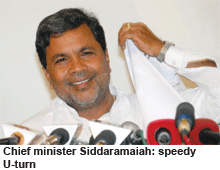A series of about turns by the Congress government in Karnataka on the issue of student admissions into the state’s 250 professional i.e. medical, engineering, dental, etc colleges has created a crisis in professional education in the state.
 On December 14, the state government led by chief minister M. Siddaramaiah announced an intent to implement the long-pending Karnataka Professional Educational Institutions (Regulation of Admission and Determination of Fee) Act, 2006 (KPEI Act), which empowers the state’s private professional colleges to conduct their own “single common entrance test” and stipulates formation of a fees fixation committee to determine the tuition chargeable by them. A fees committee under the chairmanship of Justice Ajit J. Gunjal, a retired judge of the Karnataka high court, has been constituted to determine the fee structure of each private college depending on factors such as location, investment in infrastructure and number of study programmes.
On December 14, the state government led by chief minister M. Siddaramaiah announced an intent to implement the long-pending Karnataka Professional Educational Institutions (Regulation of Admission and Determination of Fee) Act, 2006 (KPEI Act), which empowers the state’s private professional colleges to conduct their own “single common entrance test” and stipulates formation of a fees fixation committee to determine the tuition chargeable by them. A fees committee under the chairmanship of Justice Ajit J. Gunjal, a retired judge of the Karnataka high court, has been constituted to determine the fee structure of each private college depending on factors such as location, investment in infrastructure and number of study programmes.
The fallout of the declared intent to implement the KPEI Act, 2006 from the next academic year beginning July, is that success in the state government-conducted Common Entrance Test (CET) will ensure admission only into state government and aided medical and engineering colleges which number a mere 12 and 21 respectively. On the other hand under the current seat-sharing agreement (renewed annually) between the government and the Consortium of Medical, Engineering and Dental Colleges-Karnataka (COMED-K), the state’s 187 private professional colleges surrender 25-45 percent of seats to CET toppers at rock-bottom prices.
With the KPEI Act eliminating the need for this consensual agreement, availability of seats to CET toppers at highly subsidised, government prescr-ibed fees in top private institutes will soon become history. For instance the number of engineering seats available at government fees would shrink to around 6,150 from the 42,200 that were available under seats sharing arrange-ments. Likewise medical seats available to CET toppers will fall to around 1,150 from 2,200 (almost 50 percent) as there are only 12 government medical colleges while in dental education, CET toppers will have to compete for a mere 100 seats as there are only two government dental colleges in the state.
Unsurprisingly, the government’s decision to reduce the number of seats available to CET toppers drew a flood of protests from middle class parent and student communities used to availing heavily subsidised professional education for the past several years. Confronted with loud public protest, on December 20 the state government did a U-turn with chief minister Siddaramaiah announcing that the government won’t implement the KPEI Act, 2006 in the coming academic year. “In the interest of students, we have taken this decision.... The earlier system will continue,” Siddaramaiah told reporters, adding that the government intends to sign a consensual seat-sharing agree-ment with private professional colleges again.
Inevitably, private professional colleges which have to surrender 25-45 percent of capacity at way-below-cost tuition price to CET toppers, are less than ecstatic about the status quo. They are no longer willing to sign the traditional consensual agreement with the government on seat-sharing and a common fees structure. There’s consi-derable heartburn within private professional education providers that despite three Supreme Court judge-ments (T.M.A. Pai Foundation (2002), Islamic Academy (2003) and P.A. Inamdar vs. State of Maharashtra (2005)) upholding the right of private self-financed professional colleges to determine their own “reasonable’’ tuition fees and transparent admission proc-esses, the state government continues to arm-twist them to allocate upto 45 percent of capacity to “merit’’ students who pay rock-bottom tuition fees.
“It’s becoming increasingly unviable for private professional colleges to maintain their institutions and pay Sixth Pay Commission faculty salaries while providing highly subsi-dised education. If the state government is worried about meritorious economically disadvantaged students being denied privately provided professional education, it should subsidise them with loans and scholarships,” says Dr. S. Kumar, president (medical education) of the Gokula Education Foundation which runs the top-ranked M.S. Ramaiah Medical College in Bangalore, and executive secretary of COMED-K.
Meanwhile as we go to press, the state government has announced an intent to amend the KPEI Act to address public fears about tuition fees and entrance tests. Within the government and collective national mindset, the practice of the State passing on the burden of educating middle class stud-ents to private professional colleges is deeply entrenched. Another prolonged round of litigation is in the offing.
Summiya Yasmeen (Bangalore)